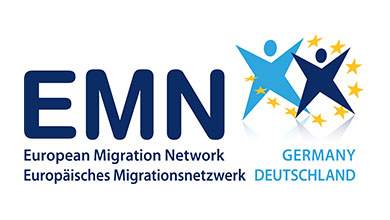Return Policy in Germany in the Context of EU Rules and Standards ,
 Source: BAMF
Source: BAMF
The study looks at return from Germany from a legal perspective – starting with the return decision, the study then presents the possibilities and conditions to return voluntarily as well as the enforcement of returns through a removal.
Time and again, migration policy discussions have focused on return. As the number of asylum seekers jumped in 2015 and 2016, the number of rejected asylum applications rose as well – and as a result, returning those who are not entitled to stay in Germany to their countries of origin has become a political priority and a controversially discussed issue.
What is return policy?
Return policy covers both residence law provisions, which may give rise to an obligation to return, and rules and provisions on forced and voluntary return. Autonomous or voluntary return is preferred over forced return. German return policy is influenced on the one hand by European law, such as the Return Directive (Directive 2008/115/EC), and on the other hand by the federal structure of the country. It is the Länder and their foreigners authorities which are responsible for enforcing removals and conducting voluntary returns.
European rules on return
The Return Directive is at the core of European return policy. It sets out that voluntary return should be preferred over forced return and obliges all Member States to issue return decisions to any third-country nationals who are staying irregularly on their territory. The Directive was implemented in Germany in 2011. In March 2017, the European Commission released a recommendation on the implementation of the Return Directive and other EU provisions. It recommends to the Member States to use the leeway granted by the Return Directive in key provisions in such a way that only minimum standards are adhered to, for example concerning the period granted for voluntary departure or the maximum length of detention for removal purposes.
The impact of European provisions on German return policy
The implementation of the Return Directive led to some important changes in German residence law. Some of the most important changes are that a period for departure between seven and 30 days must be set, that certain safeguards for the return of unaccompanied minors were introduced and that any entry ban is limited to five years at most. Other key changes took place later on the back of decisions by the European Court of Justice and the Federal Court of Justice. It was decided, for example, that detention may only take place in specialised detention facilities, and not in regular prisons.
New developments in return policy
Both the Federal Government and the European Union (EU) have intensified their return policy initiatives since 2015. On the EU level, apart from the recommendation on the Return Directive mentioned above, there is increased cooperation with third countries with a view to increase readmissions. Germany has taken measures on the political, institutional and practical level in 2016 and 2017. Among them count the Act to Improve the Enforcement of the Obligation to Leave the Country, which entered into force on 29 July 2017, and the launch of the Repatriation Support Centre where the Federal Government and the Länder cooperate closely in return matters since March 2017. Measures have also been taken to increase the number of voluntary returns, for example with the information portal www.returningfromgermany.de or with the "StarhilfePlus" Programme.
Author of the study: Paula Hoffmeyer-Zlotnik

